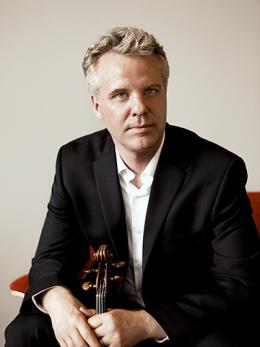by Daniel Hathaway
Oberlin violin professor Sibbi Bernhardsson joins conductor John McLaughlin Williams and CityMusic Cleveland Chamber Orchestra for a 7:30 concert at St. Noel Church in Willoughby Hills.
At the same hour, Christopher Wilkins leads the Akron Symphony in Holiday Pops 2024 in E. J. Thomas Hall and Sara Hicks conducts and emcees a holiday concert by The Cleveland Orchestra and Chorus at Severance Music Center.
Note: Apollo’s Fire’s performance of Handel’s Messiah tonight at Trinity Cathedral is sold out.
For details of these and other upcoming events, visit our Concert Listings.
INTERESTING READ:
An article by Zachary Lewis posted yesterday in The Land features 85-year-old Cleveland composer Margaret Brouwer. Click here to read “Margaret Brouwer, Cleveland’s unofficial composer laureate, has no intention of stopping or slowing down.”
TODAY’S ALMANAC by Jarrett Hoffman
Polish-born American violinist Samuel Dushkin, who was born on this date in 1891 in Suwałki, was involved in bringing a number of important works to life, particularly in partnership with Igor Stravinsky during the early 1930s.
That began with the premiere of Stravinsky’s Violin Concerto — the composer’s first work for violin — and continued with several works for violin and piano. The Duo Concertante and Divertimento were both written by Stravinsky to play with Dushkin on tour, while the Suite Italienne — a transcription from the composer’s ballet Pulcinella — was made in collaboration with the violinist.
Click here to listen to a 1935 recording of the Concerto as performed by Dushkin and the Lamoureux Orchestra, led by Stravinsky himself.
Dushkin is also known to history for his involvement in a work he did not premiere — and not by his own choosing. That would be William Schuman’s Violin Concerto, which the violinist commissioned with the idea of premiering it with Serge Koussevitzky and the Boston Symphony. Only, at this point in Dushkin’s career, it seems that his playing had seen better days, something that Schuman discovered after meeting with Dushkin in late 1947 to hear him play. By that point, the concerto was already written.
“I will play, but not with Dushkin,” Koussevitzky would go on to tell Schuman — adding that it would be on the composer, of course, to pass this information along. “I don’t care what your agreement is.” (Dushkin had exclusive rights to the concerto for three years.) “Take it away from him. We’ll give it to Isaac Stern and play it with the Boston Symphony.”
After attending a concert together, Schuman and Dushkin sat down for drinks. As the composer later related in an interview, he broke the news like this:
Listen, Sam, this is the most difficult moment of my life in personal relationships, and it will be for you, too, but I can’t go on with the Violin Concerto. I know you were a great performer at one time, but no one is going to play it [with you], and this is what I have to tell you.
Dushkin’s response? He broke his cocktail glass in two. The experience was, in the eyes of Schuman,
Just terrible…it was one of the saddest things in my life. I still don’t know whether I was right or wrong.
(They do seem to have eventually put the past behind them after the death of Schuman’s parents.)
The three years of exclusivity passed, and in 1950, with Koussevitzky having stepped down at the BSO, Isaac Stern premiered the Concerto with the orchestra and new music director Charles Munch. Listen to that performance here.
What can only have added to Schuman’s angst over the whole situation is that he wasn’t entirely pleased with Stern’s interpretation — or with the piece itself. He went on to revise it twice, the final version being premiered in 1959 at Aspen Music Festival with violinist Roman Totenberg and conductor Izler Solomon — and the composer was finally satisfied.



